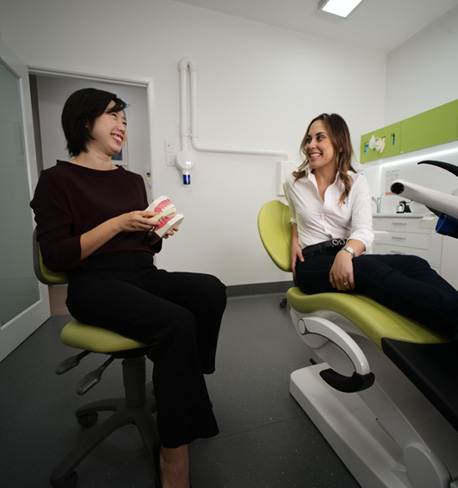
Teeth Whitening
Book a check-up- Home
- Treatments
- Cosmetic Dentistry
- Teeth Whitening
Teeth Whitening
Teeth Whitening and Bleaching West End
A POPULAR COSMETIC DENTIST OPTION TO ENHANCE YOUR NATURAL SMILE
Do you feel that your teeth are dull and can benefit from a refreshing dental treatment? Teeth whitening is an option to enhance your smile by making your teeth whiter and brighter without damaging your existing teeth.
What is teeth whitening?
Teeth whitening is a chemical process used to lighten the colour of your teeth. It targets stains and discolouration which improves the appearance of your teeth. The teeth whitening process does not remove any of the tooth surface.
What can cause my teeth to be discoloured?
There are a number of reasons why your teeth have become discoloured and why you might be considering teeth whitening:
- Natural dull coloured teeth
- Stains from strong coloured food and drink such as coffee and red wine
- Smoking
- Tartar or calculus build up
- Cracks in the teeth which take in stains
- Teeth have become more stained as you have aged
Is teeth whitening safe?
Most patients biggest worry about the teeth whitening procedure is if the treatment is safe. Dentists and professionals have tested to make sure the products used in teeth whitening are both safe and effective.
With most treatments there a few risks that can occur within the teeth whitening procedure:
- Higher concentrations of bleach are used in the in-office treatment. This can irritate the gums if they come into contact with the bleach. This irritation is reduced by cleaning the gums to remove any bleach.
- Teeth with excessive sensitivity might feel pain or discomfort through the procedure as they tend to react to a difference in temperatures.
- Teeth with tooth decay, fractured structures or broken fillings can experience more discomfort than healthy teeth.
What are my teeth whitening options?
You have the choice of in-office bleaching (performed entirely in the dental chair) or take-home teeth whitening.
- The in-office whitening takes about two hours in the dental chair. A comprehensive check-up and teeth cleaning is recommended prior to the whitening session. The procedure begins with a short preparation to cover and protect the gums, leaving the teeth exposed. The dentist then applies the whitening gel which will break up the stains and discoloration on your teeth. The gel is applied every 15 minutes, for a total treatment of three rounds.
- For take-home whitening, the dentist will construct a set of custom-made bleaching trays for you. The custom trays ensure that the correct amount of whitening material is used and that the patient’s teeth are properly exposed. The dentist provides the patient with the materials and instructions and also answers all questions the patient may have about the procedure. A home whitening session can last about 45 minutes each night for one to two weeks. Typically, two or three weeks after your home teeth whitening regime, you will return to your dentist for a follow up visit.
How long does teeth whitening last?
Teeth whitening is not a permanent procedure. Results can last for one year or more, depending upon your personal habits and diet; food and drinks such as coffee, red wine and tomato based foods can adversely affect the whitening treatment.
In most cases, the whitening procedure is very effective and patients are pleased with the results.
Teeth Whitening Brisbane
At My Dental Care @ West End, we provide a wide range of cosmetic dental services. If you’re looking to have your teeth professionally whitened, we’re happy to assist you in any way we can! Contact us today and take that step towards improving your smile and overall oral health.
Frequently asked Questions
Is teeth whitening suitable for everyone?
Teeth whitening is generally safe for most individuals, but it may not be suitable for everyone. Factors such as pregnancy, age (children under 16), dental health issues like gum disease or tooth decay, tooth sensitivity, existing dental work (such as fillings or crowns), allergies to whitening products, and realistic expectations about the results can affect the suitability of teeth whitening. It’s important to consult with your dentist before undergoing treatment to assess your oral health and determine the best approach for achieving your desired results safely.
Can I whiten my teeth if I have dental restorations?
Teeth whitening treatments may not be effective on dental restorations such as fillings, crowns, or veneers. The whitening agents used in these treatments typically only affect natural tooth enamel and may not change the colour of these restorations. If you have dental restorations and are interested in whitening your teeth, it’s best to consult with your dentist. They can evaluate your specific situation and recommend the best course of action, which may include alternative cosmetic dental treatments to improve the overall appearance of your smile. Supplementary treatments may be needed to achieve your desired effect.
How long does a teeth whitening treatment take?
In-office teeth whitening treatments typically take about 60 to 90 minutes. This involves applying a whitening gel to your teeth and using a special light or laser to activate the whitening agent.
Take-home whitening kits may require daily use for a few days to a few weeks, depending on the desired effect. The take-home kits we provide typically involve 3-5 days of usage, with custom-made trays filled with a whitening gel worn for a specified amount of time each day.
It’s important to follow your dentist’s instructions carefully for the best results. They can provide guidance on how long to wear the trays and how often to use the whitening gel based on your individual needs.
What is used to whiten teeth?
Teeth whitening treatments typically use bleaching agents like hydrogen peroxide and carbamide peroxide to remove stains. Hydrogen peroxide penetrates the enamel to break down discolouration, while carbamide peroxide works more slowly, making it ideal for at-home kits. Whitening toothpaste, strips, and gels often contain these agents. Professional treatments at your dentist’s office use higher concentrations and sometimes light or laser technology to enhance the effect. Natural remedies like baking soda and activated charcoal are also used but are less well-documented. Always consult your dentist for the best advice.
How long does teeth whitening take?
The duration of teeth whitening varies depending on the method used. Professional in-office whitening typically takes about 1 to 2 hours, with results often visible immediately after the treatment. At-home whitening kits provided by your dentist involve wearing custom-made trays filled with a bleaching agent for a specified period each day, usually for 3 to 5 days. Over-the-counter whitening products, such as whitening strips, gels, and trays available at drugstores, generally need to be used daily for 1 to 2 weeks to see noticeable results. Overall, the time needed for teeth whitening can range from a single session of a few hours to several weeks, depending on the method and the individual’s teeth condition.
Do I have to give up any food or drinks after a teeth whitening procedure?
After a teeth whitening procedure, it’s generally recommended to avoid certain foods and drinks for at least 7 days to maintain the effectiveness of the treatment and prevent staining. During this period, you should steer clear of dark-coloured beverages such as coffee, tea, red wine, cola, and other dark sodas, as they can stain your teeth. Acidic drinks like citrus juices and sports drinks should also be avoided because they can weaken the enamel, making it more susceptible to staining. Additionally, dark-coloured foods such as berries, tomato sauces, soy sauce, and balsamic vinegar can contribute to discoloration. It’s also important to avoid tobacco products, whether smoked or chewed, as they can cause significant discoloration. Coloured candies and sweets, which often contain artificial dyes, should be avoided, as well as strongly pigmented spices like curry and turmeric. Maintaining good oral hygiene and following these dietary recommendations can help keep your teeth whiter for longer.
Does whitening damage teeth?
Teeth whitening, when done correctly, is generally safe and does not cause significant damage to the teeth. However, there are some considerations and potential risks. Whitening can cause temporary tooth sensitivity because the bleaching agents can penetrate the enamel and irritate the nerve endings in the teeth. Sensitivity typically subsides a few days after the treatment. Additionally, bleaching agents can irritate the gums if they come into contact with them, though this irritation is usually temporary and can be minimised by carefully applying the whitening product. Overuse or misuse of whitening products can lead to enamel erosion, so it’s important to follow the instructions and not use whitening products more frequently than recommended. Uneven whitening can occur if you have dental restorations like crowns or fillings, as these will not change colour along with your natural teeth. Consult your dentist about supplementary treatments to achieve your desired effect. Whitening should not be done if there are untreated cavities or gum disease, as it can exacerbate these conditions. It’s essential to consult with your dentist before starting any whitening treatment to ensure it’s safe for your specific dental health. Overall, when used as directed and under professional supervision, teeth whitening is a safe cosmetic procedure with minimal risk of damage.

Make an Enquiry with My Dental Care West End
Fill in the online enquiry form to book an appointment. We look forward to seeing you soon. Or call today (07) 3846 2548





